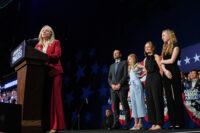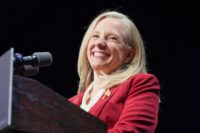Spanberger names transition team leaders
Virginia Gov.-elect Abigail Spanberger announced her transition team Wednesday, as she prepares to take office in January 2026.
Abigail Spanberger elected Virginia governor in a historic first that boosts Democrats ahead of 2026
Democrat Abigail Spanberger won the Virginia governor’s race Tuesday, defeating Republican Lt. Gov. Winsome Earle-Sears to give Democrats a key victory heading into the 2026 midterm elections and make history as the first-ever woman to lead the commonwealth.
Earle-Sears, Spanberger talk biz credentials in Va. Chamber forum appearances
They didn’t meet face-to-face, but the presumptive Republican and Democratic nominees for Virginia’s 2025 governor race addressed the same audience Friday at the 2024 Virginia Economic Summit and Forum on International Trade in Richmond. Lt. Gov. Winsome Earle-Sears, the frontrunner for the GOP nomination, spoke just after 9 a.m. at the event co-sponsored by the […]
Stoney declares candidacy for Va. governor
Richmond Mayor Levar Stoney declared his candidacy for governor Monday, setting up an early contest with U.S. Rep. Abigail Spanberger, who announced her own run for the Democratic nomination last month. The general election will take place in November 2025. If elected, he would be Virginia’s second Black governor, more than 30 years after the […]
Va. governor’s race coming down to the wire
One week out from Election Day, the Virginia governor‘s race remains very close, according to two polls released this week. Former Gov. Terry McAuliffe, the Democratic nominee, has small leads over Republican challenger Glenn Youngkin that are within the surveys’ margins of error. Released Wednesday morning, Christopher Newport University’s Wason Center for Civic Leadership’[...]
















